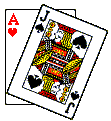



| The Blackjack Super Quiz |
| by Edward D. Collins |
This is a quiz that I wrote back in
1987 for myself |
1) You're playing blackjack on the Las Vegas Strip against a single deck. You are playing Basic Strategy and are not card counting. You're dealt 7, 7 against the dealer's 10. What do you do? 2) You're on the Strip in Las Vegas and once again you are not counting cards. You're dealt Ace, 3 vs. the dealer's 3. What do you do? 3) Once again, Strip / Basic Strategy / not counting / single deck game. You're dealt 4, 4 vs. the dealer's 6. What do you do? 4) Describe the term "insurance" and how it works. 5) Two deck game - you're counting cards and have Ace, 9 vs. an Ace. The dealer asks if anyone wants insurance. Counting your hand and the dealer's Ace, you now know 21 cards have been dealt. 16 of these were non-tens and 5 were tens. Do you take insurance? Why or why not? 6) Single deck game... you have 9, 2 vs. an Ace. You now have seen four tens and eleven non-tens. Again, do you take insurance? Why or why not? 7) Finish the following Basic Strategy chart for the Las Vegas Strip: |
| Your hand | Dealer's upcard | Single Deck | Multiple Deck |
| Ace, 6 | 4 | double | ? |
| Ace, 7 | 2 | ? | ? |
| 10 | 10 | ? | ? |
| 9 | 3 | ? | ? |
| 8, 8 | 10 | ? | ? |
| 7, 7 | 2 | ? | ? |
| 9 | 3 | ? | ? |
| 8)
On the average, how often will you receive a blackjack in
a single deck game? 9) On the average, how often will you receive a blackjack in a four-deck game? 10) Give me the names of three authors of blackjack books. 11) What is the definition of a front-loader? 12) There is only one hand in which you would play differently if you were downtown rather than on the Strip in a single deck game using Basic Strategy. What is the hand and what is the difference? 13) What is the difference between conventional surrender and early surrender? 14) The following three rules are all advantageous to the player. However, which rule is the least advantageous?
15) Give four advantages in playing a "shoe" rather than a single deck. 16) Fill in the blank: When the dealer has a __ up, his chance of busting is at its greatest. 17) Fill in the blank: When the dealer has a __ up, his chance of busting is at its lowest. 18) What is the definition of a running count? What is the definition of a true count? 19) If you are flat betting, what are you doing? 20) What is the definition of a "stiff" hand? 21) Situation: You are playing two hands at one time with the same amount of money wagered on each hand. (Let's say $10.) Hand "A" is Ace, 9 (a good hand with a total of twenty) and hand "B" is 9, 7 ( a poor hand, with a total of sixteen.) The dealer has an Ace up and asks if you want insurance. You've been keeping track of the 10's in the deck and have decided that it is indeed wise to take insurance... but you have just $5 left... only enough money to insure one hand!! Which hand should you insure, the good one or the bad one? 22) As you know, the dealer must play by a fixed set of rules. On the average, how often does the dealer bust?
True or False 23) When playing blackjack in Atlantic City, you are only allowed to double down on 10 or 11. 24) When playing blackjack in Northern Nevada, you are only allowed to double down on 10 or 11. 25) If a player splits 10's, he is always making a bad play. 26) Ace, 6... Ace, 3, 3... Ace, 5, Ace are all examples of "soft seventeen." 27) According to Basic Strategy, you should hit Ace, 6 vs. the dealer's 7. 28) It is advantageous to you, to have a dealer stand rather than hit on soft 17. |